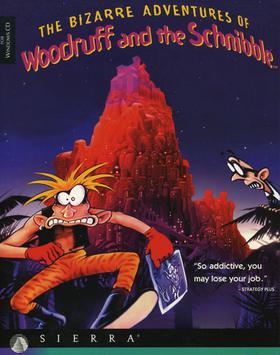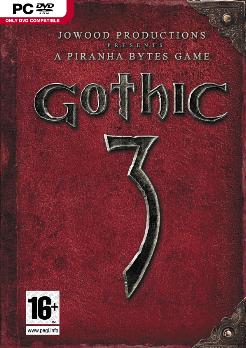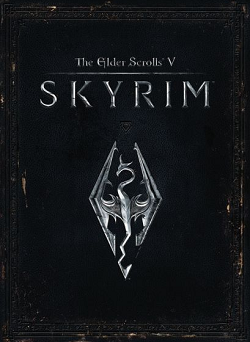
Sin is a first-person shooter video game developed by Ritual Entertainment and published by Activision in 1998. It uses a modified version of the Quake II engine. Sin is set in the dystopian future of 2037, where John Blade, a commander in a security force named HardCorps in the megacity of Freeport, is tasked to rid the city of a recreational drug that may be tied to the rival biotechnology megacorporation, SinTek.

Fallout is a media franchise of post-apocalyptic role-playing video games created by Tim Cain and Leonard Boyarsky, at Interplay Entertainment. The series is set during the first half of the 3rd millennium, and its atompunk retrofuturistic setting and artwork are influenced by the post-war culture of the 1950s United States, with its combination of hope for the promises of technology and the lurking fear of nuclear annihilation. A forerunner of Fallout is Wasteland, a 1988 game developed by Interplay Productions. Fallout is regarded as a spiritual successor to Wasteland.
Ultra Software Corporation was a shell corporation and publishing label created in 1988 as a subsidiary of Konami of America, in an effort to get around Nintendo of America's strict licensing rules in place at the time for the North American market. One of these rules was that a third-party company could only publish up to five games per year for the Nintendo Entertainment System in the US.

Troika Games was an American video game developer co-founded by Jason Anderson, Tim Cain, and Leonard Boyarsky. The company was focused on role-playing video games between 1998 and 2005, best known for Arcanum: Of Steamworks and Magick Obscura and Vampire: The Masquerade – Bloodlines.

The Precursors is a 2009 first-person shooter game developed by Ukrainian game studio Deep Shadows. The game was released for Windows in Russia on 4 December 2009. It was then released worldwide through GamersGate on 21 December 2010 and through Steam on 4 February 2017. It is set in a futuristic sci-fi environment where many political factions are engaged in an intergalactic war. The player is able to explore a multitude of planets, travel through outer space to complete missions, obtain information, and buy weapons and supplies in an open world free-roaming environment. It received mixed reviews from critics.

Illusion of Gaia, known in PAL territories as Illusion of Time, is an action role-playing video game developed by Quintet for the Super Nintendo Entertainment System. The game was released in Japan by Enix in 1993, and in North America and PAL territories by Nintendo in 1994 and 1995. Set in a fantasy reimagining of Earth, the game's plot centers on a boy named Will who is chosen to save the world from an impending disaster. During the course of the game, the player guides Will through levels based on ancient ruins of real-world civilizations and Wonders of the World, such as the Great Pyramid and the Great Wall of China.

Teenage Mutant Ninja Turtles: Turtles in Time, released as Teenage Mutant Hero Turtles: Turtles in Time in Europe, is a beat 'em up arcade video game produced by Konami and released in 1991. A sequel to the original Teenage Mutant Ninja Turtles arcade game, it is a scrolling beat 'em up type game based mainly on the 1987 TMNT animated series. Originally an arcade game, Turtles in Time was ported to the Super Nintendo Entertainment System in 1992 under the title Teenage Mutant Ninja Turtles IV: Turtles in Time, continuing the numbering from the earlier Turtles games released on the original NES. That same year, a game that borrowed many elements, Teenage Mutant Ninja Turtles: The Hyperstone Heist, was released for the Sega Genesis.

Call to Power II is a PC turn-based strategy game released by Activision as a sequel to Civilization: Call to Power, which itself was named after the Civilization series by Sid Meier; this game could not have "Civilization" in its title because the license to the Civilization name was lost.

Woodruff and the Schnibble of Azimuth is a 1995 French adventure game developed by Coktel Vision. The creator of the Gobliiins series, Pierre Gilhodes, worked on the game, and Woodruff shares that series' visual style, gameplay and offbeat humor, though is not an official part of the Gobliiins series or canon.

Leonard Boyarsky is an American computer game designer and visual artist. He is one of the key designers of the video games Fallout and Diablo III.

Fallout: A Post Nuclear Role Playing Game is a 1997 role-playing video game developed and published by Interplay Productions, set in a mid-22nd century post-apocalyptic and retro-futuristic world, decades after a nuclear war between the United States and China. Fallout's protagonist, the Vault Dweller, inhabits an underground nuclear shelter. The player must scour the surrounding wasteland for a computer chip that can fix the Vault's failed water supply system. They interact with other survivors, some of whom give them missions, and engage in turn-based combat.

Gothic 3 is a fantasy-themed open world action role-playing game for Microsoft Windows developed by Piranha Bytes. It is the sequel to Gothic II.

Jason D. Anderson, usually credited as Jason Anderson, is a video game developer. He started out as a contract artist for Interplay on the USCF Chess project. He was later hired to work on Fallout for which he became Lead Technical Artist, working on the original game design, interface, and quests. After working on the prototype design for Fallout 2, Anderson left with fellow developers Timothy Cain and Leonard Boyarsky to found Troika Games. After Troika Games collapsed, Anderson left the game industry for a short time to sell real estate.

Empire Earth III is a real-time strategy video game developed by Mad Doc Software and published by Sierra Entertainment, released on November 6, 2007. It is the last installment of the Empire Earth series.

Last Armageddon is a 1988 post-apocalyptic role-playing video game for the NEC PC-8801, MSX, Sharp X68000, MS-DOS, PC Engine CD-ROM², and Nintendo Family Computer. The game was exclusively in the Japanese language until an English translation patch was created for the Nintendo Famicom.

Fallout: New Vegas is a 2010 action role-playing game developed by Obsidian Entertainment and published by Bethesda Softworks. It was released for Microsoft Windows, PlayStation 3, and Xbox 360. Set in the Mojave Desert 204 years after a devastating nuclear war, the player controls a courier who wakes up after being shot in the head by an unknown assailant. While tracking down their assailant, the courier becomes embroiled in a larger conflict between different governing factions vying for control of the region. Fallout: New Vegas features an open world map that the player can freely explore. Much of the gameplay revolves around combat, and there are a variety of weapons the player can use, such as melee weapons, conventional guns, and energy-based weapons. An optional difficulty level is Hardcore Mode, which adds survival mechanics such as a need to routinely eat, drink, and sleep.
Silver Style Entertainment was a video game developer based in Berlin, Germany, founded in 1993 by Carsten Strehse. In 2006, the company was taken over by The Games Company, and became an in-house development studio. Originally, the company developed largely for the PC, but following the acquisition it has shifted its focus to include consoles such as the Xbox 360.
An unofficial patch is a patch for a piece of software, created by a third party such as a user community without the involvement of the original developer. Similar to an ordinary patch, it alleviates bugs or shortcomings. Unofficial patches do not usually change the intended usage of the software, in contrast to other third-party software adaptions such as mods or cracks.

The Elder Scrolls V: Skyrim is a 2011 action role-playing game developed by Bethesda Game Studios and published by Bethesda Softworks. It is the fifth main installment in The Elder Scrolls series, following The Elder Scrolls IV: Oblivion (2006), and was released worldwide for Microsoft Windows, PlayStation 3, and Xbox 360 on November 11, 2011.

Fallout 4 is a 2015 action role-playing game developed by Bethesda Game Studios and published by Bethesda Softworks. It is the fourth main game in the Fallout series and was released worldwide on November 10, 2015, for PlayStation 4, Windows, and Xbox One. The game is set within an open world post-apocalyptic environment that encompasses the city of Boston and the surrounding Massachusetts region known as "The Commonwealth".

















